The United Kingdom (UK) is one of the world’s most popular travel destinations, thanks to its rich history, diverse culture, and famous landmarks, with almost 40 million visitors making the trip in 2024. The UK is made up of four distinct countries: England, Scotland, Wales, and Northern Ireland. Any trip over to the UK is exciting, even more so when travelers head off in search of the road less traveled. Full of unique, quirky, and whimsical towns that offer something a little different from the usual tourist destinations, here are six offbeat towns worth visiting. From the oldest tennis courts in Britain to the spooky Cushendun Caves, each town has a hidden surprise in store for travelers.
Falkland, Fife – Scotland
Falkland is a picturesque and quirky village known for its historic Falkland Palace—a Renaissance palace with an extensive garden and one of Britain’s oldest tennis courts. In fact, it is the world’s oldest tennis court that is still in use. The palace was built between 1501 and 1541 by James IV, famous for marrying the sister of Henry VIII of England, and James V, the son of James IV, who became king at just over a year old. Enjoy the architecture of the palace beloved by Mary, Queen of Scots, explore a living willow labyrinth and giant chess board, and wander around the estate visiting the Physic Garden with over 50 Renaissance-era plants used to make medicine.
The village outside the palace feels like stepping back in time with its cozy cafes, eccentric local shops, and winding medieval streets—it was the location of the fictional town of Inverness in the TV series “Outlander.” Stop in Campbell’s Coffee House & Eatery for coffee and home-baked treats or Pillars of Hercules, famous locally for its organic, homegrown vegetables, fruit, herbs, and eggs.
Hay-on-Wye, Powys – Wales
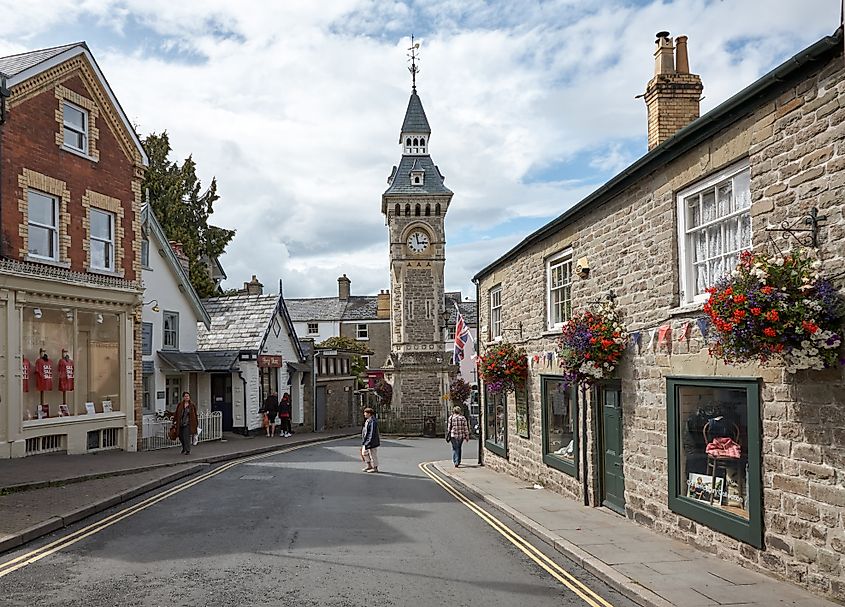
Hay-on-Wye is a small market town located in Powys, Wales, in a unique position on the border between England and Wales. It is a book lover’s paradise, world-renowned for its books and bookstores, including Richard Booth’s Books, which was one of the first second-hand bookshops to open in town over 50 years ago; Stella & Rose’s Books, which specializes in rare and out-of-print children’s books; Murder and Mayhem; and Haystacks for pre-loved vinyl and books. The town also hosts the annual Hay Festival—an 11-day literary festival that draws over 100,000 visits every spring.
Location is everything in this small village, and Hay-on-Wye is surrounded by the Black Mountains, Brecon Beacons National Park, and the winding River Wye. Local outfitters like Walk Hay and Black Mountain Adventure can arrange guided walks and canoe trips, or visitors can explore the river beach called The Warren by the locals, skimming stones or picnicking.
Dungeness, Kent – England
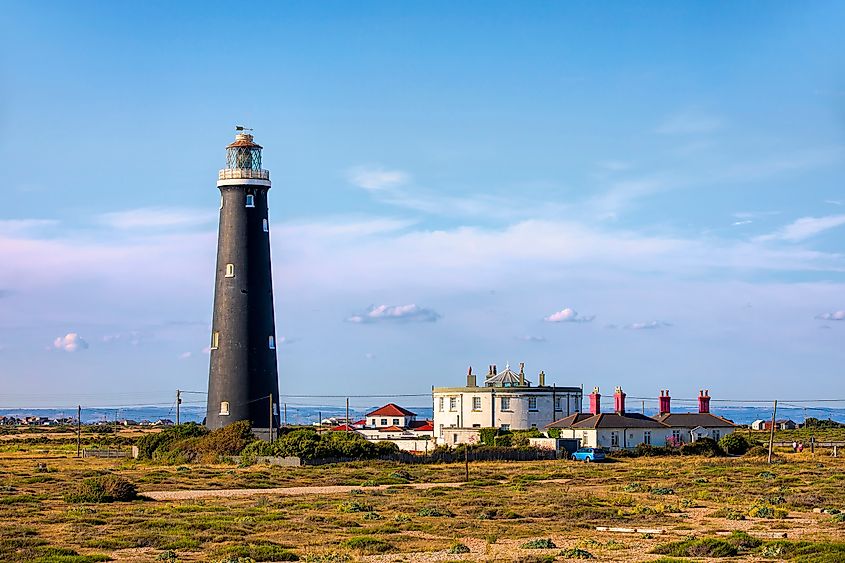
What can be more offbeat than visiting what the UK national’s weather service, the Met Office (Meteorological Office), calls “Britain’s only desert?” Dungeness is located on the southern coast of Kent on a prominent “shingle headland” jutting into the English Channel. A shingle headland is a coastal point of land composed of eroded river stones. It is part of the Romney Marsh area, known for its unique, almost post-apocalyptic desert-like landscape, rare bird life, and several lighthouses—perfect for photographers and Instagrammers.
The Old Lighthouse opened in 1904 and survived two world wars before it was decommissioned in 1960. It is a popular place for visitors who can climb the tower for panoramic views of the English Channel, shingle beaches, the Dungeness Nature Reserve, and the surrounding English countryside. Enjoy the nearby trails and walks to the beach, or plan to have fish and chips at the Pilot Inn or the nearby Dungeness Snack Shack on the beach.
Cushendun, County Antrim – Northern Ireland
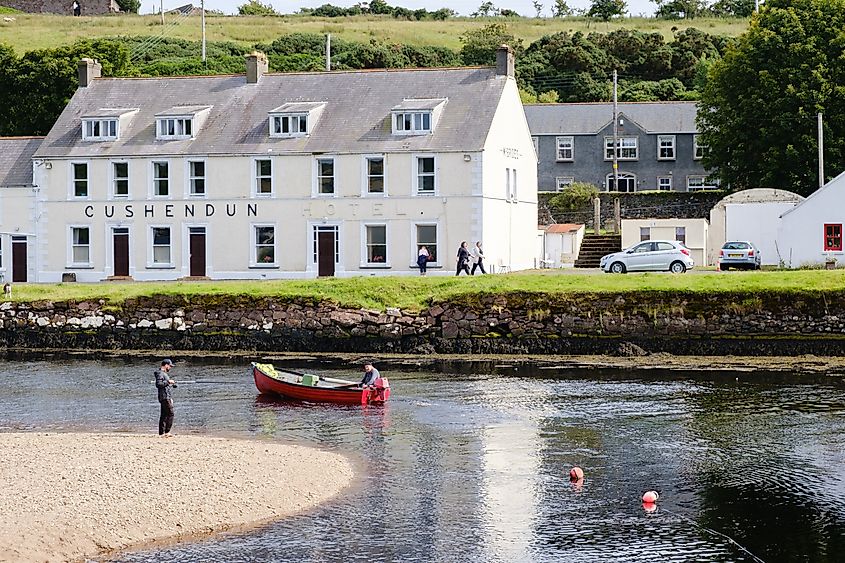
The picturesque seaside village of Cushendun stands out for its whimsical architecture, including the 1834 Glenmona House, the ruins of a 14th-century castle, and the Cushendun Caves. The caves formed over 400 million years ago through natural erosion, long before they became a location in the “Game of Thrones” TV series. The town itself exudes a rustic vibe, as it was built in 1912 to look like a Cornish village with charming whitewashed stone cottages and scenic coastal views by Baron Cushendun as a gift to his wife. Still, the castle’s ruins reveal the town’s much older history.
Visitors can wander through the historic village with a stop at one of the smallest pubs in Ireland, Mary McBride’s, or the Village Tearooms for a traditional Sunday roast. Visit the old sandstone church built in 1840 or head further afield to explore the iconic Glens of Antrim. This iconic landmarks features nine Glens carved out during the Ice Age and dominates 80 miles of cliff on the north coast of Ireland.
Clovelly, Devon – England
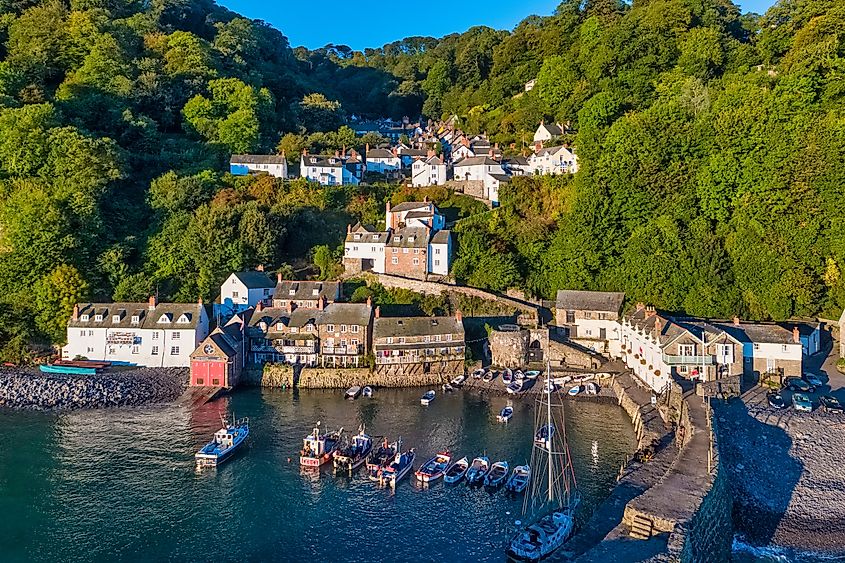
A cliffside fishing village with steep cobbled streets, Clovelly was once owned by the Queen of England. While the town is not designated as a national landmark, it is recognized as a heritage site, and a small fee is required to visit to help protect its architectural and environmental features. The village is perched on a 400-foot cliff and bans motor vehicles, but the Clovelly Village ticket does give visitors access to Clovelly Court Gardens, the Fisherman’s Cottage & Kingsley Museum.
Stroll through the well-tended court gardens and Victorian greenhouses, which provide all the locally sourced produce for the 18th-century Red Lion Hotel’s two eateries: the Harbour Restaurant and the Snug & Harbour Bars. Coastal Walks dot the landscape, and visitors can enjoy walking along part of the South West Coast Path, one of England’s longest national trails, or wandering the Woodland Walk full of ancient trees, including a Gingko Tree.
Portmeirion, Gwynedd – Wales
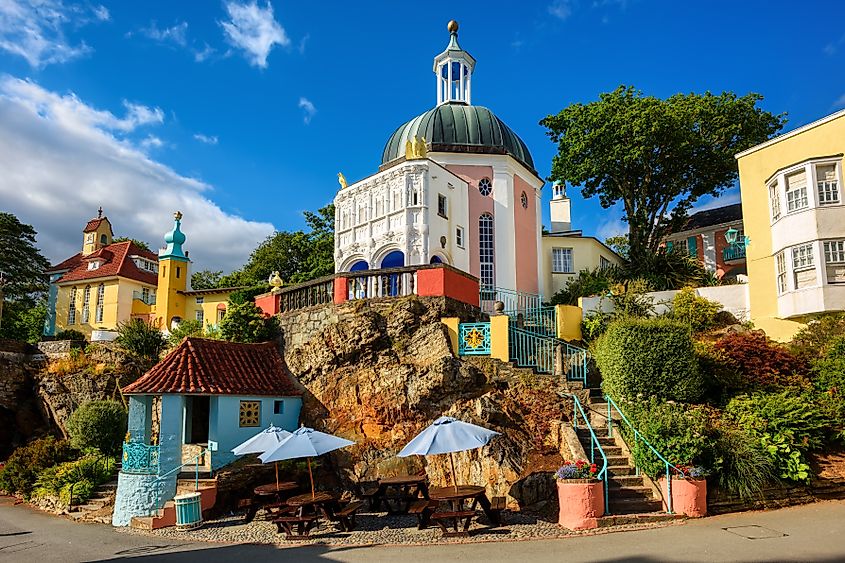
A whimsical, Italian-style village on the coast of North Wales, Portmeirion was designed by famous Welsh architect Sir Clough Williams-Ellis, who used an eco-friendly approach in building a town with a strong Mediterranean influence. It is one of the premier destinations in Wales, attracting 200,000 visitors annually who come to see the colorful buildings and surreal atmosphere.
Shopping is a popular pastime in Portmeirion, with a store devoted to the 1960s cult classic TV show “The Prisoner.” Pot Jam sells Welsh produce, from chutneys to Portmeirion’s wine and champagne, fresh bread, cheeses, and locally made fudge and cake. Meanwhile, the Ship Shop carries high-end souvenirs and designer homeware. Moreover, a few lovely cafés are in the village, including Caffi’r Angel, which serves its very own Italian gelato.
Summary
Exploring the quirky charm of the UK leads to offbeat towns like Falkland, Fife, with its Renaissance palace and medieval streets, and Hay-on-Wye, a book lover’s paradise. Dungeness in Kent stands out as Britain’s only desert, while Cushendun in County Antrim enchants visitors with its whimsical architecture and scenic coastal views. Clovelly, Devon offers cobbled streets and heritage charm with a ban on motor vehicles. Lastly, Portmeirion in Gwynedd captivates tourists with its Italian-style design and colorful buildings, which create a surreal escape along the North Welsh coast.
